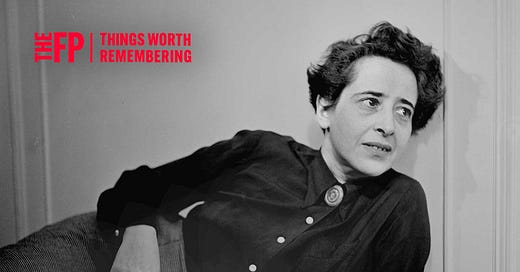
Welcome to Douglas Murray’s column, Things Worth Remembering, in which he presents great speeches from famous orators we should commit to heart. To listen to Douglas read from Hannah Arendt’s 1964 speech at the University of Chicago, scroll to the end of this piece.
This week, I want to turn to a speech about forgiveness and why forgiveness is so important when it comes to freedom—the freedom of both the forgiver and the forgiven.
Some speeches are memorable because of their rhetorical power. Others stick with you because of the depth of their insights. Sometimes that comes with the feeling “I know that to be true.” Sometimes it’s more like “I’m going to need to think about that.”
When I first read this magnificent talk given by Hannah Arendt, I felt both.
Arendt is the political philosopher best known for her monumental 1951 work The Origins of Totalitarianism. Her speech took place on November 10, 1964 at the Divinity School of the University of Chicago. The title of the conference she spoke at—“Christianity and Economic Man: Moral Decisions in an Affluent Society”—and that of the lecture she delivered—“Labor, Work, Action”—were not encouraging. Certainly, they lacked the wit of William F. Buckley or the emotional force of James Baldwin. But none of that matters here, because of the content of the speech itself.



